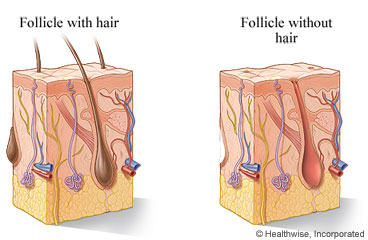Hair Loss From Alopecia Areata in Children: Care Instructions
Overview

Alopecia areata (say "al-uh-PEE-shuh ar-ee-ah-tuh") is a type of hair loss that affects the hair on
the scalp or other areas of the body. The condition can go away for some time and then come back. It's most
common in young people, but it can happen at any age.
Your child's hair may fall out in clumps and grow back over time. The way hair is lost and grows back is
different for everyone. For many people, the hair grows back within a year.
You may decide to wait and see if your child's hair grows again before trying medicines. Treatment may
include medicine you put on the scalp or skin. However, medicines don't always work.
Your child may have a range of feelings about their hair loss. Support your child's self-esteem. Talk with
your child about their hair loss and answer their questions. Explain what alopecia areata is. This can help
your child know how to answer questions from other children and adults.
Follow-up care is a key part of your child's treatment and safety. Be sure to make and go to all
appointments, and call your doctor if your child is having problems. It's also a good idea to know your
child's test results and keep a list of the medicines your child takes.
How can you care for your child at home?
-
If you decide to treat your child's hair loss, use medicines exactly as prescribed. Call your child's
doctor if you think your child is having a problem with a medicine.
-
Try hair products and styles that make hair look thicker. Or your child could wear a hat. Shaving their
scalp is also an option.
-
Talk to your child's doctor if your child is upset about their hair loss. Your child can get counseling to
help.
When should you call for help?
 Watch closely
for changes in your child's health, and be sure to contact your doctor if:
Watch closely
for changes in your child's health, and be sure to contact your doctor if:
Current as of: November 16, 2023
Content Version: 14.0
Care instructions adapted under license by your
healthcare professional. If you have questions about a medical condition or this instruction, always ask
your healthcare professional. Healthwise, Incorporated disclaims any warranty or liability for your use of
this information.